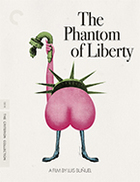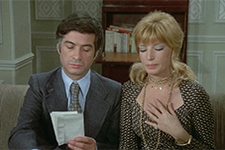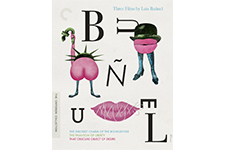| Director: Luis Buñuel | | Screenplay: Luis Buñuel & Jean-Claude Carrière | | Stars: Adriana Asti (Sister of the 1st police commissioner), Julien Bertheau (1st police commissioner), Jean-Claude Brialy (M. Foucauld), Adolfo Celi (M. Legendre’s physician), Anne-Marie Deschott (Mlle Rosenblum), Paul Frankeur (Innkeeper), Pierre Lary (The sniper), Michel Lonsdale (The hatter), François Maistre (Police academy instructor), Muni (The Foucaulds’ nursemaid), Hélène Perdrière (The old aunt), Michel Piccoli (The 2nd police commissioner), Claude Piéplu (Chief of police), Jean Rochefort (M. Legendre), Bernard Verley (French army captain), Monica Vitti (Mme Foucauld), Miléna Vukotic (Nurse) | | MPAA Rating: R | | Year of Release: 1974 | | Country: Italy / France |  |
|  As cowriter Jean-Claude Carrière notes in a brief excerpt from a 2000 interview originally recorded for The Criterion Collection DVD of The Phantom of Liberty (Le Fantôme de la liberté), master surrealist and provocateur Luis Buñuel was essentially given free reign when making it because his previous film, The Discreet Charm of the Bourgeoisie (1972), directed when he was 74 years old, had won the Academy Award for Best Foreign Language Film. The result is one of Buñuel’s most narratively unconventional films, stringing together a series of loosely connected vignettes that focus on various illogical situations and absurdities. It is clearly one of the most directly surreal films he had made since the beginning of his artistic endeavors in the late 1920s, although it is not particularly provocative, despite the overt criticisms of everything from the middle class, to the church, to the military. In fact, if anything, The Phantom of Liberty plays like a Buñuel greatest hits platter, once again spinning the usual suspects into a surreal world where the joke is squarely on them. Buñuel and Carrière, who had already collaborated on five films, beginning with Diary of a Chambermaid (1964), dive headfirst into the dreamlike logic of the surreal, eschewing narrative arcs, cause and effect, and understandable human behavior. When one character announces suddenly that he is sick of symmetry, the line might just as well have come from Buñuel’s mouth directly. The Phantom of Liberty is first and foremost a comedy—a frequently hilarious one—that derives its laughs by consistently going against the expected. Buñuel’s actors play everything decidedly straight, as if nothing is at all wrong with fancy dinner guests pulling down their trousers and hiking up their skirts to sit at toilets around a dining room table, ascetic monks playing poker and betting their religious icons, or a prim and proper husband and wife being simultaneously appalled and aroused by photographs of landscapes and European monuments. There is a lightness and playfulness to the film that marks it in contrast to Buñuel’s earlier works, such as Un Chien Andalou (1929), which above all sought to shock and repel. In his old age, Buñuel mellowed in his tone, albeit not in his subject matter; social hypocrisy and the purely arbitrary nature of civilized life are still his primary targets. This is not to say that The Phantom of Liberty doesn’t have any sting; in fact, some of the film’s segments have a defiantly nasty bite to them, particularly one about a sniper who picks off people at random from the top of an office building and is later swarmed by fans wanting his autograph when he is released (even though he was convicted). The senselessness of human violence snakes throughout the film, as does our twisted fascination with it. The sniper story surely resonated with particular force during the Vietnam era, only a decade after the Kennedy assassination, and it has an entirely different (though no less powerfully upsetting) slant in the era of school shootings and terrorism (a topic Buñuel exploited brilliantly in 1977’s The Obscure Object of Desire). The title The Phantom of Liberty is, according to Buñuel, a nod to Karl Marx’s The Communist Manifesto, but it is more interesting to think of it as a relatively arbitrary title. After all, almost any other word could be substituted for Liberty—Morals, Society, Relationships, Love—and convey the same sense of the human need to delude itself into a sense of rationality. Buñuel saw the world as a dream, and he made films accordingly. To try to make sense of The Phantom of Liberty, to dig out a moral or a message or a connecting theme, is an exercise in absurdity that only Buñuel himself could possibly top. | The Phantom of Liberty Blu-ray |  The Phantom of Liberty is available as part of The Criterion Collection’s “Three Films by Luis Buñuel” box set, which also includes The Discreet Charm of the Bourgeoise (1972) and That Obscure Object of Desire (1977). The Phantom of Liberty is available as part of The Criterion Collection’s “Three Films by Luis Buñuel” box set, which also includes The Discreet Charm of the Bourgeoise (1972) and That Obscure Object of Desire (1977). | | Aspect Ratio | 1.66:1 (all three films) | | Audio | French Linear PCM 1.0 monaural (all three films) | | Subtitles | English | | Supplements | The Castaway of Providence Street, a 1971 homage to Luis BuñuelSpeaking of Buñuel, a 2000 documentary on Buñuel’s life and workOnce Upon a Time: “The Discreet Charm of the Bourgeoisie”, a 2011 television program about the making of the filmInterviews from 2000 with screenwriter Jean-Claude CarrièreArchival interviews on all three films featuring Carrière; actors Stéphane Audran, Muni, Michel Piccoli, and Fernando Rey; and other key collaboratorsDocumentary from 1985 about producer Serge SilbermanAnalysis of The Phantom of Liberty from 2017 by film scholar Peter William EvansLady Doubles, a 2017 documentary featuring actors Carole Bouquet and Ángela MolinaPortrait of an Impatient Filmmaker, Luis Buñuel, a 2012 short documentaryExcerpts from Jacques de Baroncelli’s 1929 silent film La femme et le pantinAlternate English-dubbed soundtrack for That Obscure Object of DesireTrailersEssays by critic Adrian Martin and novelist and critic Gary Indiana, along with interviews with Buñuel by critics José de la Colina and Tomás Pérez Turrent | | Distributor | The Criterion Collection | | Release Date | January 5, 2021 | | | COMMENTS | | Criterion originally released all three of these films on DVD in the early 2000s, so it has been more than two decades since their original transfers. Each of the films in this three-disc set boasts a new, high-definition digital restoration, which has resulted in notably improved visual quality. All three films were transferred in high-definition from 35mm interpositives and their 35mm magnetic tracks. Compared to the DVDs, the images on these discs are brighter, sharper, and have better color and consistency, as well as demonstrably less signs of age and wear. All three films look great, with excellent detail and plenty of intact, visible grain. Some of the inconsistencies in the old DVDs, such as the notably increased graininess in the nighttime scenes in That Obscure Object of Desire, are less noticeable here. All three films feature their original monaural soundtracks in clean, Linear PCM transfers. That Obscure Object also includes an optional English-dubbed track. This set is, not surprisingly, absolutely bursting with supplementary material. Much of it has been ported over from the original Criterion DVD releases, but quite a bit of it is new, as well. On The Discreet Charm of the Bourgeoisie disc, we get a pair of outstanding documentaries from the original 2000 DVD: The first, El náufrago de la calle de Providencia (The Castaway on the Street of Providence), is a 24-minute documentary homage compiled by Arturo Ripstein and Rafael Castanedo, long-time friends of Buñuel’s with whom he used to drink martinis and have long talks while they were living in Mexico. The majority of the footage was filmed during these evening get-togethers in 1970, and the documentary is composed largely of Buñuel’s friends talking about him, as well as footage of Buñuel himself carefully making martinis, which to him was akin to a religious experience. The second documentary, A propósito de Buñuel (Speaking of Buñuel), is feature-length (it runs roughly 98 minutes). Directed by Jose Luis López-Linares and Javier Rioyo, it is an engaging examination of Buñuel’s entire career, from birth to death. It features on-camera interviews with several dozen people, including Buñuel’s two sons, many of his closest friends, and numerous actors and writers with whom he worked. The film will be interesting to both Buñuel novices and those who are familiar with his cinematic oeuvre, which spans 50 years and multiple countries. López-Linares and Rioyo follow Buñuel all over the world, from his initial collaborations with Spanish surrealists like Salvador Dalí, to his brief work at the Museum of Modern Art in Manhattan, to his extended career in Mexico (where he became a citizen), to his return to his native Spain. Although it does not cover in-depth every film Buñuel made (that would be quite a chore, considering that he directed 32 films), it does focus on Un Chien Andalou (1928), L’age d’or (1930), Las Hurdes (1932), Los olvidados (1950), Rehearsal for a Crime (1955), Virdiana (1961), The Exterminating Angel (1962), Simon of the Desert (1965), Tristana (1970), and That Obscure Object of Desire (1977). New to this edition is a 52-minute episode of the documentary series Once Upon a Time from 2011 that offers a deep dive into the film’s production and cultural history that includes interviews with screenwriter Jean-Claude Carriere, actors Stephane Audran and Bulle Ogier, and first assistant director Pierre Lary, among others. We also get “The Making of The Discreet Charm of the Bourgeoisie,” a 14-minute episode from 1972 of the French program Pour le cinéma that includes footage of Buñuel working on the set, as well as with interviews with him and actors Stephane Audran, Jean-Pierre Cassel, Bulle Ogier, Fernando Rey, and Delphine Seyrig. On The Phantom of Liberty disc, we get the same five-minute “introduction” to the film by co-screenwriter Jean-Claude Carrière, which is really an excerpt from a video interview recorded in 2000. He briefly discusses writing the script with Buñuel and what they were trying to accomplish (his favorite bit is the story about the parents looking for the lost child who is with them the whole time). Also included is “Analysis of The Phantom of Liberty,” a 20-minute visual essay from 2017 by film scholar Peter William Evans (author of The Films of Luis Buñuel: Subjectivity and Desire) that covers quite a bit of ground, with particular focus on Buñuel’s political, artistic, and cultural inspirations. We also get a 1974 episode of the French television series Pour le cinéma featuring Michel Piccoli and Jean-Claude Brialy; a 1974 episode of the French television series Le dernier des cinq that also features Brialy; and The Producers, a half-hour program from 1985 about producer Serge Silberman, who worked with Buñuel on five of his final seven films, including the three in this box set.. That Obscure Object of Desire’s disc is arguably the most loaded of the three. It ports over most of the supplements from the 2001 DVD, including an 18-minute video interview with Carrière, in which he discusses working with Buñuel, Buñuel’s directorial style, and the idea of using two actresses for the role of Conchita, among other things. We also get the inclusion of three scenes from Jacques de Baroncelli’s 1929 silent film version of La Femme et le pantin, the negatives for which were rediscovered in the 1990s. The three scenes—Conchita’s nude dance, her mocking Mathieu from behind the iron gate, and Mathieu’s violent attack on her the next day—correspond closely to scenes in Buñuel’s version (despite being a silent film, Baroncelli’s version is no less erotic or explicit in terms of nudity). Added to that, we get Lady Doubles, a 38-minute documentary from 2017 that includes interviews with Carole Bouquet and Ángela Molina, the two actresses who played Conchita; Portrait of an Impatient Filmmaker, Luis Buñuel, a 16-minute documentary from 2012 that includes interviews with cinematographer Edmond Richard and assistant director Pierre Lary, who recall their experiences collaborating with Buñuel on numerous projects; a 15-minute episode of the French television program Le monde du cinéma from 1977 featuring Carriére, Rey, and Silberman; “Remembering Buñuel”, a 30-minute episode of the French program Allons au cinéma from 1977 that documents a conversation among Carriére and actors Julien Bertheau, Muni, Michel Piccoli, and Fernando Rey about their experiences with Buñuel. All three discs includes original theatrical trailers, and the insert booklet features essays by critic Adrian Martin and novelist and critic Gary Indiana, along with interviews with Buñuel by critics José de la Colina and Tomás Pérez Turrent. All in all, this is a superb package that gives the films a fine presentation and is loaded with supplementary material. |
Copyright © 2021 James Kendrick Thoughts? E-mail James Kendrick All images copyright © The Criterion Collection |



 (3)
(3)

 The Phantom of Liberty is available as part of The Criterion Collection’s “Three Films by Luis Buñuel” box set, which also includes The Discreet Charm of the Bourgeoise (1972) and That Obscure Object of Desire (1977).
The Phantom of Liberty is available as part of The Criterion Collection’s “Three Films by Luis Buñuel” box set, which also includes The Discreet Charm of the Bourgeoise (1972) and That Obscure Object of Desire (1977). 